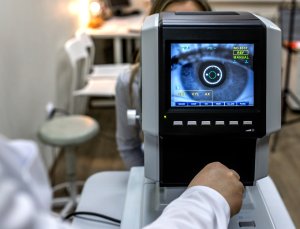Cataract Removal Surgery Doctors in Pottstown, PA

Voted Best of Berks—
eight years in a row!
Cataract removal surgery is a common and generally safe procedure aimed at treating cataracts, a condition that causes clouding of the lens in the eye. Cataracts lead to decreased vision over time. The surgery involves the removal of the cloudy lens and replacement with an artificial lens, known as an intraocular lens (IOL), to restore clear vision. In Pottstown, PA, cataract removal surgery doctors are right here in town at Eye Consultants of Pennsylvania.
Cataract surgery: what’s involved
Here’s a general overview of the cataract removal surgery process:
- Pre-operative Assessment: Before the surgery, an ophthalmologist will conduct a thorough eye examination to assess the cataract’s severity and determine the most suitable treatment plan. This typically involves measuring the shape and size of the eye, determining the power of the intraocular lens, and checking for other eye conditions that may affect the surgery.
- Surgical Procedure: Cataract surgery is usually an outpatient procedure and often takes less than an hour. It is commonly performed under local anesthesia, which means the patient remains awake during the surgery, but the eye is numbed to prevent pain. During the surgery, the surgeon makes a small incision in the cornea, breaks up the clouded lens using a procedure called phacoemulsification, and removes the cataract fragments. Then, an artificial intraocular lens is inserted into the eye to replace the natural lens.
- Post-operative Care: After the surgery, the patient may need to wear an eye shield or protective glasses for a few days to prevent any accidental harm to the eye. The ophthalmologist will typically prescribe eye drops to prevent infection and reduce inflammation. It’s crucial to attend follow-up appointments to monitor the healing process and ensure that the eye is recovering properly.
- Recovery: Most patients experience improved vision within a few days after the surgery, although it may take a few weeks for the vision to stabilize completely. It’s essential to avoid strenuous activities, rubbing the eyes, or getting water in the eyes during the initial recovery period. The ophthalmologist will provide specific guidelines for post-operative care and any necessary precautions.
Come see us
We perform cataract surgery in our state-of-the-art outpatient facilities. The procedure generally takes less than 30 minutes. We will monitor you afterward, and then a family member or friend will drive you home to rest for the remainder of the day.
Regular eye exams are key to detecting cataracts early on, and our surgeons recommend annual eye exams for all of our patients over age 65. If you have certain health conditions like diabetes or high blood pressure, we may also recommend more frequent exams.
Cataract removal surgery is safe and effective. It has a high success rate in restoring vision. However, like any surgical procedure, it may involve certain risks and potential complications, such as infection, inflammation, retinal detachment, or secondary cataracts. Patients need to discuss any concerns and potential risks with their ophthalmologist before undergoing the surgery.
If you suspect you have a cataract, or it has just been a while since your last exam, schedule an appointment with us today in Pottstown, PA, with our cataract removal surgery doctors at Eye Consultants of Pennsylvania. We promise we’ll take great care of your eyes.
Find a Doctor
Physician information including education, training, practice location and more.
Schedule an Appointment
Call 800-762-7132 or make an appointment online.





